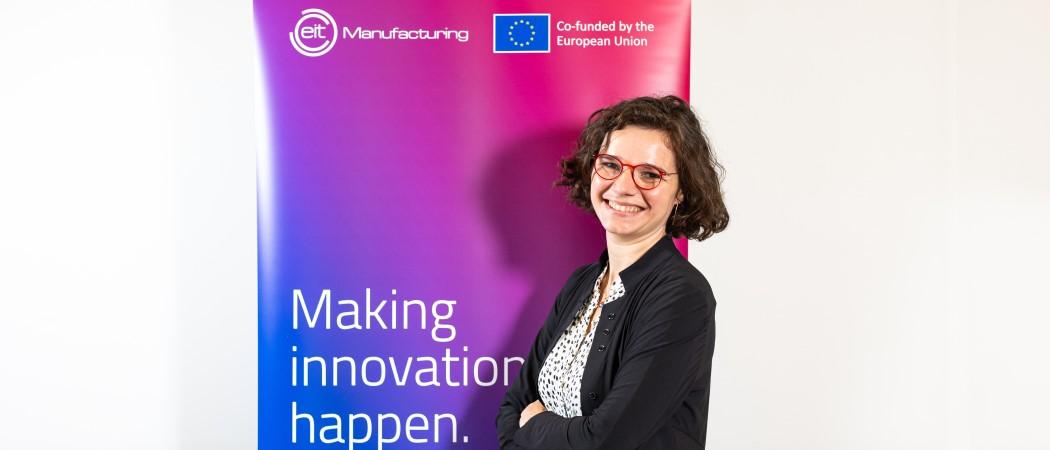Europe’s largest manufacturing innovation network is targeting its grants and educational programmes to drive diversity and develop expertise in digital and green technologies

Europe’s manufacturing sector is facing multiple challenges after the pandemic and the war in Ukraine triggered a hike in energy costs, supply chain issues and exposed dependencies on third countries for components. At the same time, the industry is under pressure to reduce its impact on the environment, while adopting new digital technologies to boost efficiency and flexibility.
To address these challenges, EIT Manufacturing, Europe’s largest manufacturing innovation network, is looking at how the region can better harness its human resources to address skills shortages and drive the innovation required for the digital and green transitions. “Even with the best technology in the world, without people, we cannot make the transformation happen,” EIT Manufacturing CEO Caroline Viarouge says.
Viarouge, who became the CEO in May 2023, wants Europe to become a leader in breakthrough innovation to support high-tech industries, such as semiconductors and biomanufacturing, within the next five to ten years, and to achieve carbon neutrality by 2050. In addition, she envisions women accounting for 40% of the workforce in manufacturing compared to the current 32%. “Diversity stimulates innovation, meaning diverse organisations are more agile and creative,” she adds.
Connecting more than 170 members from industry, academia, and research, alongside a growing network partnership around Europe, EIT Manufacturing also helps to up-skill and reskill existing employees. For example, it coordinates the Deep Tech Talent Initiative, created to train one million people in the next three years. The initiative relies on the network of more than 3,400 partners, and over 70 hubs across Europe to provide training in AI and machine learning, biotechnology, quantum computing, robotics, semiconductors and other “deep tech”.
With an aging population, Europe’s manufacturing sector also needs to attract human resources right across the continent. To that end, EIT Manufacturing deploys an ambitious Regional Innovation Scheme to accelerate innovations in countries classed as “modest” and “moderate” innovators by the European Innovation Scoreboard, through educational programmes, entrepreneurial stimulation and partnership networks. EIT Manufacturing offers tailor-made opportunities to SMEs and individuals from these countries.
Supporting green start-ups
As well as reinforcing the circularity principle in manufacturing, EIT Manufacturing is aiming to reduce the sector’s greenhouse gas emissions, which account for about 22% of European emissions. In line with the EU’s objectives, this innovation community is collaborating with the European Commission and partners in the industry to pursue the objectives of the EU’s Net-Zero Industry Act, which calls for Europe to domestically manufacture at least 40% of its clean energy technology needs by 2030.
To achieve this, EIT Manufacturing scales up start-ups, supporting them at various stages, from finding partners to creating prototypes and entering the market. A prominent example is Swedish startup Stilride, which is developing a new manufacturing technique for electro-mobility with “industrial origami” technology, which reduces material consumption, weight, and labour costs. Its technology involves robots folding steel sheets into new structures, using minimal component parts.
“The ambition of Stilride is to produce the first world climate-neutral car,” Viarouge says. EIT Manufacturing awarded Stilride a €816,000 grant in the innovation Call for Proposals 2023, helping the company form a consortium with the Swedish automotive brand Polestar, supplier of systems and components Magna Cosma, and a robotics software company ADAXIS.
“This is the kind of project we want to support: with the revolutionary technology, environmental impact, and strong innovation led by European entrepreneurs,” Viarouge stresses. In April, Stilride announced the production model of its folded-steel electric scooter, and, in the future, it plans to use the technology to build semi-trailers.
Building sovereignty through technology
Among the key priorities for the EU manufacturing industry, Viarouge names moving from linear to circular production and increasing resilience of supply chains. “In the current geopolitical situation, we cannot rely only on countries outside of Europe,” she says.
Viarouge believes production in some strategic sectors, such as semiconductors, should be brought back to Europe. She stresses, however, that it’s not enough to simply relocate the manufacturing; Europe needs its own technology. “We want to bring it in a smart way,” Viarouge says. To achieve this, EIT Manufacturing grants about €10 million a year in innovation calls, and plans to help more start-ups enter the market and grow into significant players in the coming years.
Advances in artificial intelligence (AI) provide additional opportunities to boost the competitiveness of EU manufacturing. For example, it could improve the efficiency of production processes and help reduce waste. However, before focusing on AI, it’s crucial to become stronger in data management, Viarouge says. “For now, with AI, we are still scratching the surface. The reason we are taking the smalls steps, rather than big steps, are data access and security aspects,” she added.
Viarouge stresses that the manufacturing industry is a key pillar of prosperity in Europe. Accounting for about 15% of GDP, it encompasses two million enterprises employing about 32 million people. Despite this, in recent decades, manufacturing has been neglected in some EU countries, leading to the relocation of supply chains and production to other regions. “This is why investment is really needed to stimulate growth, competitiveness, and undergo digital and green transformation,” she concludes.





 A unique international forum for public research organisations and companies to connect their external engagement with strategic interests around their R&D system.
A unique international forum for public research organisations and companies to connect their external engagement with strategic interests around their R&D system.